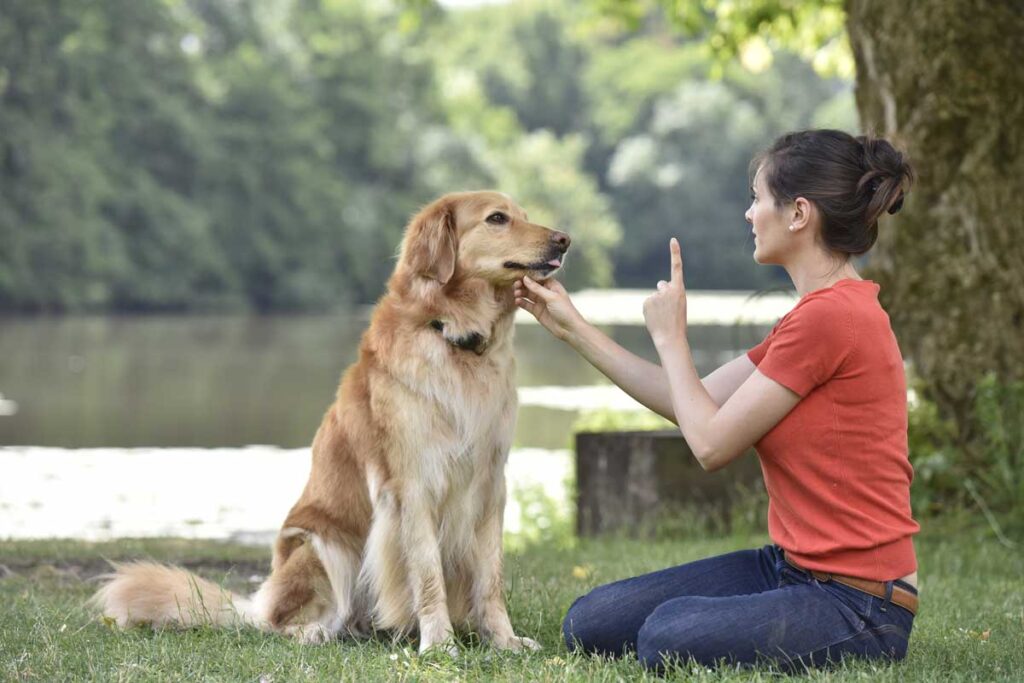4 Mistakes to Avoid When Training Your Dog

4 Mistakes to Avoid When Training Your Dog
Common dog training mistakes include repeating commands, otherwise known as ‘command nagging’, getting frustrated with your pooch, creating negative associations, failing to practice after training class and useless repetition, expecting a different result. Training your puppy or new rescue dog can be a wonderful bonding experience between you, but it can also be frustrating and sometimes challenging. The key is patience, love and practice, practice, practice. Here at Kirrawee Vet Hospital, we are your local pet experts and we’re here to help! Is it bad to not train your dog? The answer is yes, but we are here to guide you and encourage you both every step of the way.
Repeating Commands or Command Nagging
Command nagging is the term for when dog-owners repeat their commands over and over when the dog is not responding. This can be quite common and teaches the dog that you will keep going and going until they respond, so they have all the time in the world! It’s imperative to say the cue just once. If your dog is distracted, and you don’t think he’s listening, it’s better not to say it at all, as this can be dangerous. Just think, you’re trying to get your dog to come off the road but he will not listen to one ‘come,’ as you’ve taught him it’s okay to respond after you say ‘come’ five times.
Getting Frustrated
Common dog training setbacks almost always include getting frustrated and impatient. What is the best way to teach a stubborn dog to sit? Remain calm, patient and never practice when you’re in a bad mood. Dogs are very intuitive, and they know when you’re mad at them! Breathe, remember your pooch is trying his or her best, and if you’re having a bad day opt for snuggle time instead.
Creating Negative Associations
The poisoning of cues is one of the most common dog training setbacks. This is when you accidentally associate a cue or behaviour with something your dog views negatively, so they stop responding to it. For example, if ‘come’ is associated with bath time or going to the vet, the dog will pick up on this and stop listening to that command. If there’s something your dog really dislikes, avoid using those cues in relation to that activity when you first start training. After he is used to the cues and they are second nature, you may be able to get away with it without poisoning that cue.
Failing to Practice
Dog training consistency is key with new pups. Failing to practice in between classes is a problem for newly training dogs, as this takes lots of time, energy and patience. We all know that practice makes perfect, and half of the dog training classes should take place at home. If you’re wondering should only one person train a puppy, the answer is no. So, make it easier for yourself and get the whole household, family or your partner involved and this will minimise your workload and mounting pressure, as well as helping to socialise your pup. Now he can build trust with everyone who loves him and there’ll be happiness all ‘round!
Contact Your Local Dogs-perts
If you’re worried about your new pup’s behaviour or you need any help finding a reputable training school, feel free to call our team at Kirrawee Vet Hospital.
Pet Care Tips Listing
- Things to Know About Pet Diabetes
- Things to Know About Dog and Cat Arthritis
- How to Prevent Your Dog from Biting: Child Safety Tips
- How to Keep Your Dog Mentally Active
- 5 Things to Ask at Your Pet’s First Vet Appointment
- How to Deal with Kidney Failure in Dogs
- What to Do If You See Wildlife on The Road
- 5 Things You Need Before Bringing a Kitten Home
- Fleas: Causes and Prevention for Dogs
- What to Look for in a New Vet?
- How to Stop Cats from Scratching Furniture
- Questions to Ask Your Vet About Your Senior Dog in NSW
- What is separation anxiety?
- 4 Mistakes to Avoid When Training Your Dog
- Choosing Teeth-Friendly Treats for Your Pets
- How to Prepare for Camping with Your Dog
- Maintaining Good Oral Hygiene in Your Pets
- How to Know if Your Dog Has Worms and What to Do
- How to Give Your Pet Medication
- 4 Signs Your Cat Should See a Vet
- Human Food Safety for Dogs: What Foods to Avoid
- Why You Need to Vaccinate Your Puppy Before You Walk It
- How to Potty Train Puppies
- Why Should You Vaccinate Your Cat?
- What Does It Mean If Your Puppy is Limping?
- Expert Dog Swimming Tips by Kirrawee Vet
- How Often Does Your Puppy Need a Bath?
- How to Keep Your Aging Dog Comfortable
- Common Preventable Diseases in Dogs
- Common Feline Musculoskeletal Disorders
- Why Should You Vaccinate Your Dog?
- Patellar Luxation in Dogs – Expert Care in NSW
- Musculoskeletal Disorders in Dogs
- Osteoarthritis in Dogs
- Causes and Treatment of Hip Dysplasia in Dogs
- Do Dogs Need Regular Dental Care?
- Breeds of Dogs That Need the Most Exercise?
- What to Feed Fluffy? Dry or Wet? Both?
